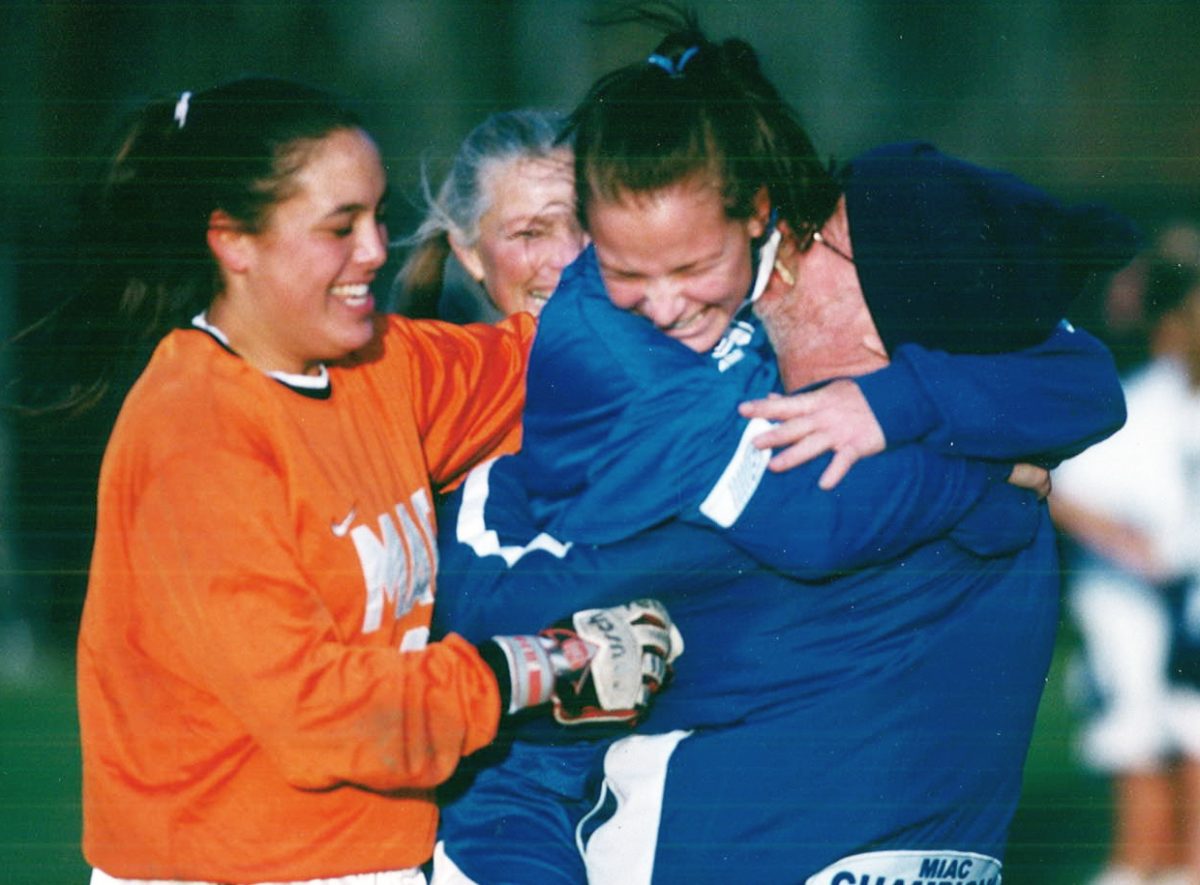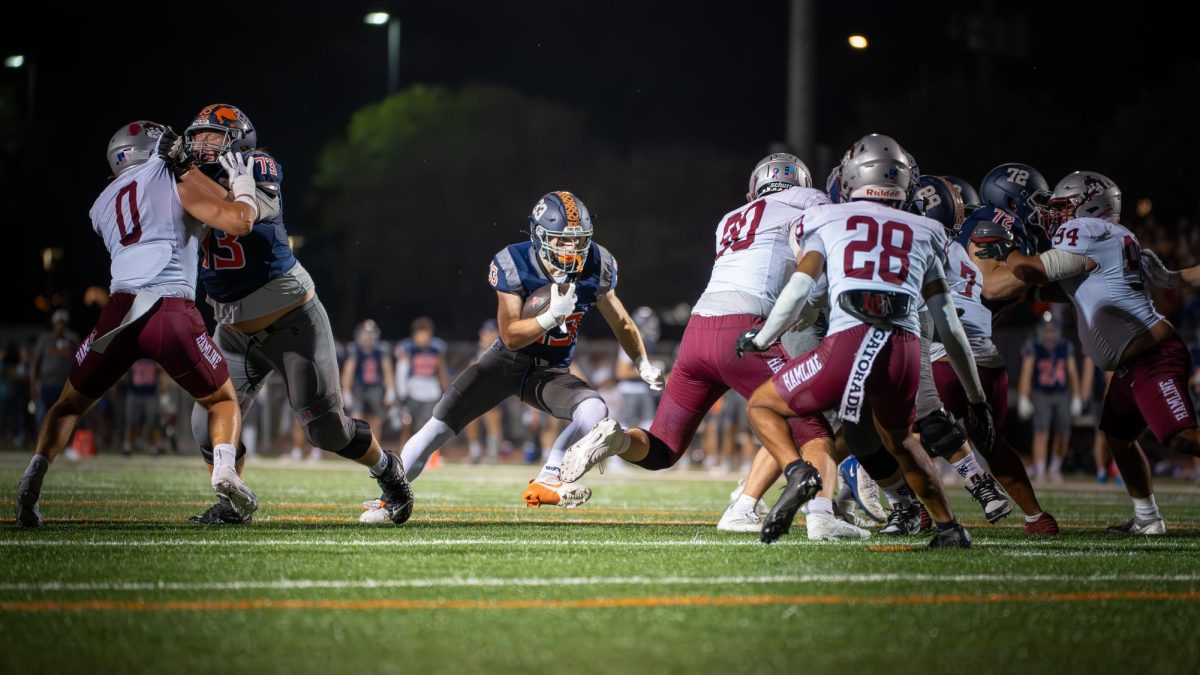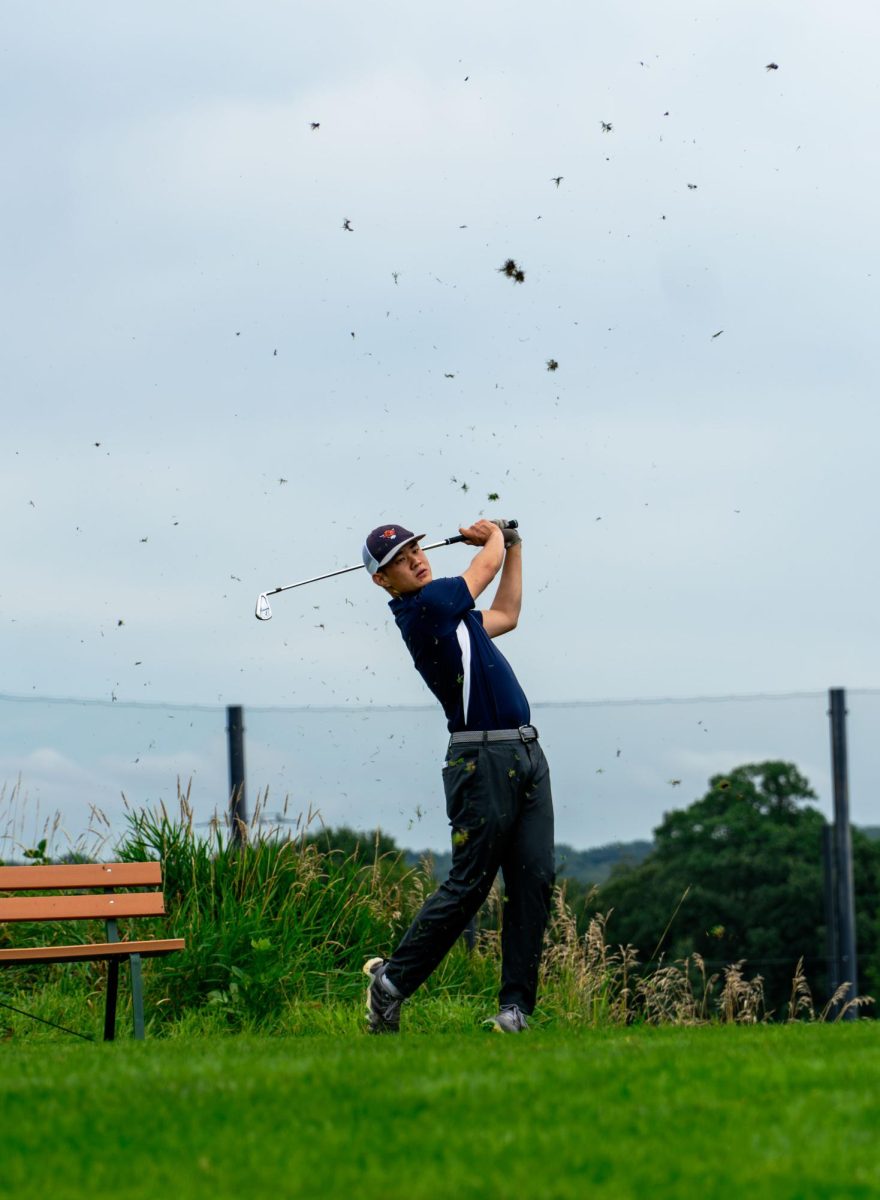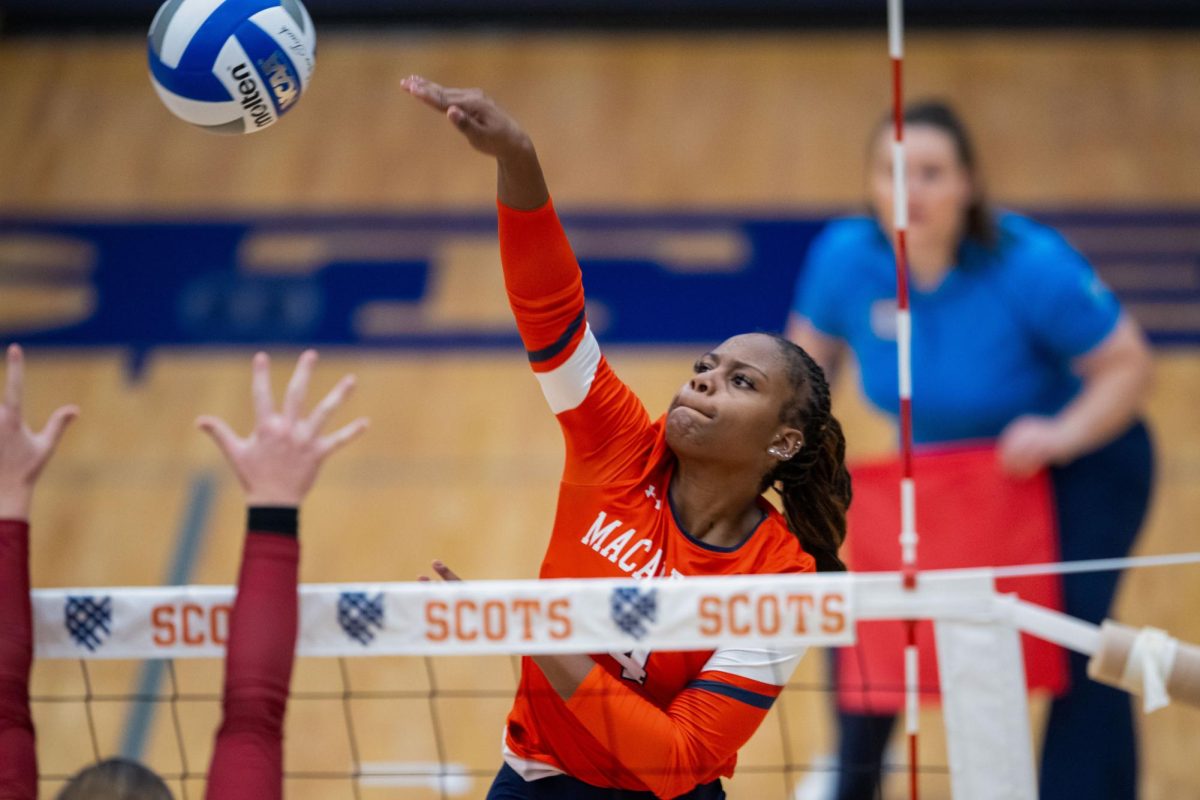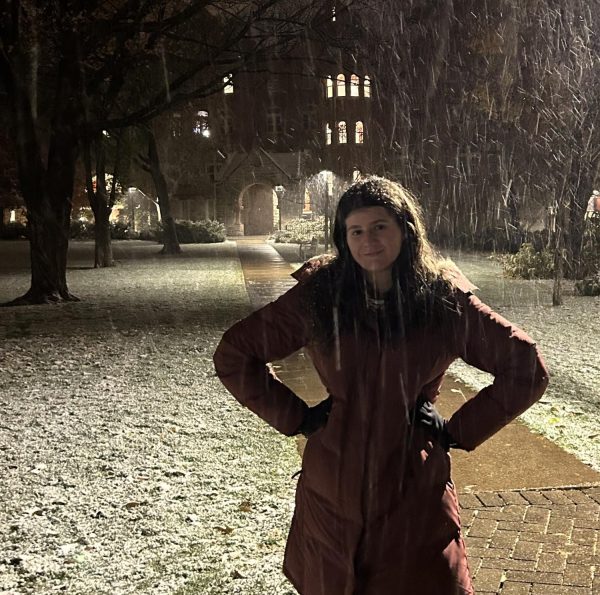On Saturday, Oct. 12, 1996, Macalester’s men’s soccer team was losing to nationally #2 ranked Amherst College. They’d managed a goal, but still faced a deficit at the half. Mac’s biggest soccer super-fan, then-senior Andrew Virden ’96 knew the team needed a boost. Known by friends as ‘Grimace’ or ‘Dark Goat,’ he would lead crowds for the next twenty years.
Against a national powerhouse, he and his friends knew they needed a cheer, and a good one. Virden thought to Mac’s countercultural spirit: “We need to channel the lapdog of Satan for this game.”
“Drink blood, smoke crack, worship Satan, go Mac!” powered the Scots to a memorable 4-2 win in overtime. Both the men’s and women’s teams would keep the energy rolling into 1997, with both squads winning Minnesota Intercollegiate Athletic Conference (MIAC) titles that year. But it was just the beginning of a rowdy, riotous 20 years of Mac soccer: two decades where both teams dominated on the field — nine men’s MIAC championships, seven women’s, and a national women’s title in 1998 — and had a bombastic fan presence.
Their cheer may be the last mark on campus of an era that feels vastly different from the current athletic environment. The 2015 men’s soccer squad was the last time Macalester won a team MIAC championship. And though the fan presence held out for a few years afterward, a ten-year championship-drought and global pandemic dampened fan culture.
Today, Macalester Athletics is trying to revitalize its campus presence. The introduction of the new highland cow mascot, Coo, was part of a full rebrand of athletics.
Athletics has also introduced the Kofi Kup program to incentivize game attendance. Basketball and football halftimes feature crowd competitions and t-shirt cannons — sometimes wielded by President Suzanne Rivera herself.
“There’s something spiritual about believing in unison,” Athletics Director Donnie Brooks said. “And what we want Mac to do is believe we can win these games in unison.”
Since Brooks claimed his position in 2019, Macalester has hired seven new head coaches. One of those almost brought a title back to Macalester: women’s swim and dive came close to breaking the school’s MIAC slump when they placed second this year. Although not a part of the MIAC, water polo won the Collegiate Water Polo Association championship three years in a row from 2017-2019 and are the second seed in the conference this season. Even so, the stands are rarely truly full; Mac is far from the eccentric fan culture that defined Mac soccer’s most successful era.
In 2010 the University of St. Thomas’ women’s soccer team refused to play Macalester on Fridays or Saturdays because Mac fans were too rowdy. The school’s culture around soccer games was not only to show up, but to bring the noise in a way that set them apart from their MIAC peers.
That quintessential Macalester flair manifested in the players on both squads and in their parents who showed up. While that group of parents would hesitate to describe themselves as ‘hooligans,’ they knew the descriptor was on the table.
Mary Weyer, mom of Matt Weyer ’11 and Andrea Weyer ’15, spoke about the tight community feel of the so-called ‘soccer parents cult,’ showing up and matching the raucous energy of the students’ section.
“We embraced them and the program and all these parents,” Mary Weyer said. “I mean, I’ve got a picture of part of the parent cult from 2010 wearing all of our little blue t-shirts and it was love. You know, the students loved it. The students were kind of like, ‘Oh my God, look at all these old people, they’re going as crazy as we are!’” Even the Catholic priest assigned to Macalester, Father Bob, was into the chants.
Cheering both was and wasn’t chaotic — it was rowdy, and often crass, but also incredibly organized. Pamphlets of coordinated chants would be distributed amongst the student section by cheering ringleaders.
“We had a cheer sheet,” Virden said. “You knew that these were the cheers, and everyone knew what the titles of the cheers were. And sometimes people would try to go rogue, but we would do cheers every five minutes, which overwhelmed any small group of people trying to just yell, “F–– you!” at the ref. We had a cheer for everything. We had a cheer for corner kicks. We had a cheer for penalty kicks.”
They even had a cheer for whenever 4:20 showed on the clock.
In the 1998 NCAA quarterfinals, during a freezing, rainy game against WashU, a Macalester fan was kicked out of the stands by officials for playing his bagpipe (bands were banned from NCAA tournaments). He walked to the mound of dirt where the Leonard Center parking lot now stands, and played on. The crowds, as three-time All-American soccer player and national champion Kate Ryan Reiling ’00 described, “went crazy.”
“Check [the] Macalester box,” Ryan Reiling said. “Bagpipe? Check! Lone person out there doing an amazing thing? Check! It had all of the Macalester things that we loved.”
Spurred on by the bagpiper’s display, the Scots won that match in penalties and then won their next two to become Macalester’s first and only national champion team.
The women’s team made the national championship final the next year, and although the 1998 title still remains the high watermark, both the men’s and women’s programs would remain perennial MIAC contenders for the next two decades, taking 16 conference titles in 20 years between the two teams.
Ryan Reiling, a key member of the 1998 team, likes to joke that what she really learned at Macalester was that “winning is way better than losing.”
Partially because, as she explained, it’s more fun to win. But also because it was a part of what being at Macalester meant: “You want to go out and you want to be excellent. You want to be excellent in the classroom. You want to be excellent in math and writing and everything you’re doing, and you also want to be excellent on the field. And we don’t need to apologize for athletic excellence, because it’s actually part of what the mission of the college is.”
The teams’ athletic excellence didn’t impede their academic pursuits:
“And when we won the national championship, and we got home that night very late, and it was right during the middle of finals,” Ryan Reiling said. “The vast majority, almost every single person, went home and studied for their finals. Now, I did not do that, because I thought it was crazy. But that’s the kind of culture that was there.”
Today, Macalester sometimes disconnects its athletic excellence from its other priorities. A sense of pessimism, where losing seems inevitable, pervades even as the women’s water polo and swim and dive teams are some of the most competitive in their conferences.
The idea that Mac’s academic prowess distances it from athletic success is inaccurate. Macalester can be — and has been — a competitive school in both rights.
As teams continue to improve across the board and look to bring a conference title back to campus after over a decade without one, campus recognition still lags behind. But Brooks sees an upward trend for the campus, saying that “we are at least at the drinking blood stage of our development.”
“The hope, long term, is that Mac students can know three or four [chants] across class years so that everybody can show up,” Brooks said. “And we could all hate St. Olaf in unison at the same time for two hours in a year… Y’all know as well as I do, if the administration comes up with the cheers and the chants, it’s gonna fail. It has to be student-driven.”
Who knows what it would take to channel the lapdog of Satan once more. Maybe a pamphlet.

